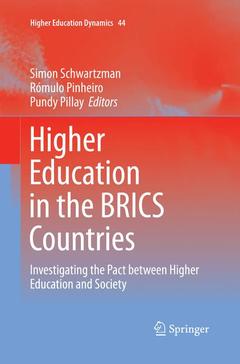Higher Education in the BRICS Countries, Softcover reprint of the original 1st ed. 2015 Investigating the Pact between Higher Education and Society Higher Education Dynamics Series, Vol. 44
Coordonnateurs : Schwartzman Simon, Pinheiro Rómulo, Pillay Pundy

In spite of the increasing attention attributed to the rise in prominence of the BRICS (Brazil, Russia, India, China and South Africa) countries, few studies have looked at the ways in which broader social expectations with respect to the role of higher education across the BRICS have changed, or not, in recent years. Our point of departure is that, contrary to the conventional wisdom focusing on functionalistic perspectives, higher education systems are not just designed by governments to fulfill certain functions, but have a tendency for evolving in a rather unpredictable fashion as a result of the complex interplay between a number of internal and external factors. In reality, national higher education systems develop and change according to a complex process that encompasses the expectations of governmental agencies, markets, the aspirations of the population for the benefits of education, the specific institutional traditions and cultures of higher education institutions, and, increasingly so, the interests and strategies of the private firms entering and offering services in the higher education market. This basically means that it is of outmost importance to move away from conceiving of "universities" or "higher education" as single, monolithic actors or sector. One way of doing this is by investigating a selected number of distinct, but nonetheless interrelated factors or drivers, which, taken together, help determine the nature and scope of the social compact between higher education (its core actors and institutions) and society at large (government, industry, local communities, professional associations).
Introduction.- The Rise of the BRICS and Higher Education Dynamics. Simon Schwartzman, Rómulo Pinheiro and Pundy Pillay.- Part I: Thematic Summaries.- Demand and Policies for Higher Education. Simon Schwartzman.- The Role of Internal and External Stakeholders. Rómulo Pinheiro.- Linking University Research and Innovation in the BRICS. Creso M. Sá.- Part II: Supply and Demand.- Demand and Supply for Higher Education in Brazil. Clarissa E. B. Neves.- Supply and Demand Patterns in Russian Higher Education. Isak Froumin and Yarolslav Kuuzminov.- Higher Education, Social Demand and Social Equity in India. Kishore M. Joshi.- Demands and Responses in Chinese Higher Education. Yuzhuo Cai and Fengqiao Yan.-Supply and Demand in South Africa. Kirti Menon.-Part III: The Role of Stakeholders.- The Role of Internal and External Stakeholders in Brazilian Higher Education. Elizabeth Balbachevsky.- Russian System of Higher Education and its Stakeholders: Ten years on the way to congruence. Evgeny Kniazev and Drantusova Natalya.- Cost Sharing in China’s Higher Education: Analyses of Major Stakeholders. Rui Yang.- The Role of Stakeholders in the Transformation of the South African HigherEducation System. Peliwe Lolwana.- Part IV: Government Policy.- Higher Education policies in Brazil: A Case of Failure in Market Regulation. Maria H. M. Castro.- The Federal State, Regional Interests and the Reinvention of Russian Higher Education. Mark S. Johnson.- The Complex Web of Policy Choices: Dilemmas Facing Indian Higher Education Reform. Roopa D. Trilokekar and Sheila Embleton.- The Chinese Model of Development and the Higher Education Policy. Qiang Zha and Ruth Hayhoe.- State Power, Transition and New Modes of Coordination in Higher Education in South Africa. Michael Cross.- Part V: Research and Innovation.- Research and the ‘Third mission” in Light of Global Events. Creso M. Sá, Andrew Kretz and Kristjan Sigurdson.- Globalization and the Research Mission of Universities in Russia. Anna Smolentseva.- Research and Innovation in Indian Higher Education. Radhika Gorur and Fazal Rizvi.- Promoting Entrepreneurship and Innovation in China: Transformations in University Curriculum and Research Capacity. Joshua K. H. Mok and Kan Yue .- Research and Innovation in South Africa. Pundy Pillay.- EPILOGUE: Higher Education in the BRICS: What Have We Learnt and Where Are We Heading? Rómulo Pinheiro, Simon Schwartzman and Pundy Pillay.
First systematic comparative investigation of higher education developments across the BRICS region
Pursues a novel approach by looking, in-depth, to a select number of key dimensions underpinning the role of higher education in society and economy
Analyses the complex interplay between numerous internal and external factors impacting on higher education dynamics across the BRICS
Provides unique empirical and conceptual insights of relevance to policy makers, institutional managers and social science researchers alike
Includes supplementary material: sn.pub/extras
Date de parution : 10-2016
Ouvrage de 493 p.
15.5x23.5 cm
Disponible chez l'éditeur (délai d'approvisionnement : 15 jours).
Prix indicatif 105,49 €
Ajouter au panierDate de parution : 04-2015
Ouvrage de 493 p.
15.5x23.5 cm
Disponible chez l'éditeur (délai d'approvisionnement : 15 jours).
Prix indicatif 105,49 €
Ajouter au panier


